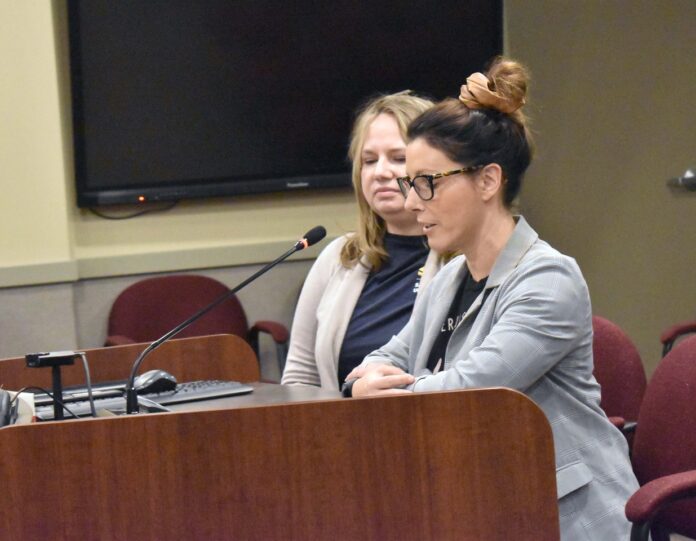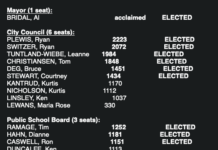By Matthew Liebenberg
Frontline health-care workers are raising concerns over the lack of protective services at the Cypress Regional Hospital in Swift Current and the violence experienced by nurses.
A delegation representing different emergency services attended a regular City of Swift Current council meeting on Jan. 22 to highlight the situation and the need for in-person security at the Cypress Regional Hospital.
The delegation included representatives from the Saskatchewan Union of Nurses (SUN) Local 69, Hutch Ambulance Service, Swift Current RCMP and Swift Current Fire Department.
A presentation was made by SUN Local 69 President Rachel Hyatt-Hiebert, who is a registered nurse in the critical care unit at Cypress Regional Hospital, and additional details were provided by Swift Current RCMP Staff Sgt. Evan Gordon.
Hyatt-Hiebert noted that the five SUN Local 69 members present at the meeting were either registered nurses or registered psychiatric nurses in the critical care unit at Cypress Regional Hospital, which is most impacted by the lack of protective services. This unit includes the emergency department, intensive care unit and inpatient mental health.
“All of those you see before you have extensive experience in these settings and have witnessed how economic instability, an increase in addictions and the growing mental health crisis in our city, along with other factors, has created an increasingly unsafe environment at the Cypress Regional Hospital,” she said. “This impacts the mental and physical health of staff, along with creating a non-therapeutic environment for the patients we serve.”
She spoke about the increasing number of violent incidents experienced by nurses at the hospital. This has been recorded in work situation reports, which are filled out to document any workplace issues and concerns.
Traditionally those issues were about lack of staff, increased workload or equipment failure, but currently 39 per cent of the unresolved work situation reports are related to safety and security. A quarter of all such reports were filed by nurses in the critical care unit and 60 per cent of those reports from inpatient mental health were about safety and security.
“Since the summer, two staff members have been off work for extended periods of time due to an assault by a violent patient, and an additional seven were assaulted leading to injury while continuing to work,” she said. “The last one was punched in the face just this past week. The impact on staff morale and our ability to provide quality patient care has been extensive. This is not new, but the frequency and intensity are.”
Hyatt-Hiebert provided details about the personal experiences of those nurses present at the meeting, which they agreed could be shared. One was off work for an extended period of time after an assault by a patient and she still experiences chronic pain. Others experienced threatening behaviour from patients. In once situation the presence of the RCMP made a difference. In another incident the two nurses had to protect themselves by holding the door shut and they then called the RCMP.
“As for myself, I’ve experienced real fear in dealing with aggressive and mentally ill individuals,” she said. “I can recall right now, like it happened yesterday, two instances in which I will be forever grateful to my EMS colleagues who stayed by my side and the RCMP who did not leave me alone.”
She noted that members of other emergency medical services have worked past their shifts and remained in the emergency department at the hospital to offer a secure presence to nurses. There have been more frequent calls to the RCMP to request their presence to ensure the safety of nurses and patients.
“We are concerned by the amount of time they have to spend providing security at our hospital,” she said. “Time spent at our facility is time spent away from our community. While grateful for their presence, the rate that this is required is increasing. It’s alarming. Is this the best use of our resources? We believe strongly it is not.”
Staff Sgt. Gordon said the Swift Current RCMP has experienced an increase of 129 per cent in calls for service at the hospital since 2019. There were 41 calls for service at the hospital in 2019 under different categories, including assaults, disturbances, general Mental Health Act issues, general assistance files, as well as damages to property. It dropped to 30 calls for service in 2020, which reflects the pandemic situation, but increased thereafter to 47 calls for service in 2021, then 67 calls in 2022 and 94 calls in 2023.
He noted this increase is worrisome for two reasons, because it highlights concerns about the health and well-being of the hospital staff as well as the proper use of resources.
“So for us, as RCMP, to be tied up in one particular place so much, it really does end up limiting the amount of work that we can do in the rest of the community,” he said. “It also in some cases causes our officers to have to triage calls. If we have someone that requires mental health assistance at the hospital, but a priority call comes in quite often, we’re going to have to send our members away from the hospital to that other location at less than a moment’s notice.”
Hyatt-Hiebert indicated that SUN Local 69 has a very good working relationship with managers, directors and the human resources division in the Saskatchewan Health Authority (SHA).
“We have collaboratively been working together on a multitude of initiatives to alleviate our concerns, but on-site protective services seem to remain elusive,” she said.
She added that SUN Local 69 had productive meetings with Swift Current MLA and Minister of Health Everett Hindley, and they felt their concerns were heard and acknowledged.
“But quite frankly, at the end of the day, our last hill to climb, so to speak, is financial,” Hyatt-Hiebert said. “In a time of finite resources and competing demands, we are in real danger of being overlooked. We are here today to ask for your assistance in advocating for on-site protective services at the Cypress Regional Hospital, not only for ourselves and our patients, but for all our community partners and the residents of Swift Current.”
City council members responded with sympathy to the presentation. There were a few additional questions from them as well as expressions of concern about the situation. Some also indicated they will use any available opportunity to raise this matter with those who are in a position to deal with it.
This newspaper requested a response from Swift Current MLA and Minister of Health Everett Hindley to these safety concerns, which he provided in a telephone interview on Jan. 26.
“This is not what nurses and health-care workers at our hospital or in any health care facility in Saskatchewan should have to experience,” he said. “And so, I take that very seriously as not only the local MLA here, but as the minister of health.”
He had a meeting several months ago during the summer with SUN Local 69 representatives, who shared information about incidents that occurred in the hospital.
“What I committed to them at the time and what I’m continuing to doing right now is working with both the Ministry of Health and the SHA to determine how we’re going to solve this issue, not just in Swift Current, but across the province,” he said.
He noted the SHA does have security measures in place at a number of health facilities across the province, but it is not consistent.
“It’s not the same across the board from facility to facility,” he said. “Not all the facilities have security in place, actually less than half do. And depending on the community and the facility, it sort of depends on what they have for security. Cypress Regional Hospital in Swift Current currently does not.”
He therefore asked the Ministry team and the SHA to formulate a plan. As a result, significant work has been done since the summer to find a long-term solution to enhance security in SHA facilities at Swift Current and across the province.
He mentioned that the Ministry of Health provides annual funding to the SHA for a variety of programs and services, including security. There have been security services at some hospitals for a long time and others are more recent.
“There’s been some additions to security in other communities in the province where this has been a growing concern,” he said. “That’s been part of the budget cycle, because if you do this, this is an annualized cost. … It’s something that needs to be built into the SHA’s annual operating budget, not just for this hospital in our community, but they have to look at it from a provincial basis as well as to how they operate this program and how they fund it.”
He added that these expenses typically need to happen in the annual operating budget, but it is not always the case.
“So specific to what’s happening here in our facility, here in our city, I’ve asked Ministry officials and SHA officials to look at what possibly could be done sooner,” he said. “And so that’s what we’re looking at.”
Hindley indicated that his MLA office in Swift Current has already received some correspondence about the issue of security at the Cypress Regional Hospital.
“There has been some additional people in our community that have been aware of the situation, that are now reaching out to me as the MLA to ask questions about it and what the plan is going forward,” he said.
He acknowledged that the issue of security can become a matter of staff retention when health-care workers do not feel safe at their workplace.
“We recognize that the world has changed and what health-care workers are dealing with now are much more complex patients that come through the hospital doors and the doors of our medical clinics,” he said. “There’s also more and more presentations of people and patients that are struggling with very severe mental health and addiction issues. Sometimes that is the cause of some of these incidents. But as a health-care worker, that’s not something that they should have to deal with. They need to be able to focus on providing health care, taking care of people. So that’s why it’s important for us to find an answer to this quickly.”






